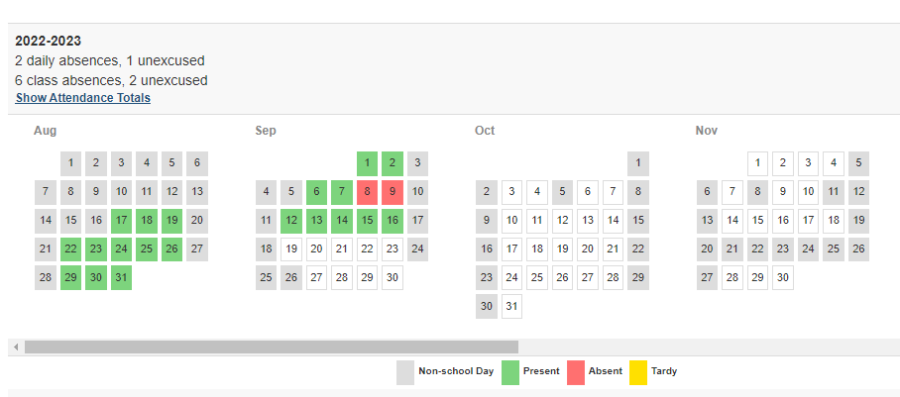The Controversy of 10/20: How Strictly Should Attendance Be Controlled?
The 10/20 rule for attendance at Gables has been the receiver of recent criticism for being too strict compared to previous years.
Imagine being in your senior year, excited for graduation and already planning what you are going to wear for prom. Suddenly, you are told that you cannot attend these once-in-a-lifetime events because you missed a few days of classes. With the first month of school already in the past, students are beginning to acclimate to their first school year almost completely free of COVID-19 restrictions in several years. With this transition, Coral Gables Senior High has updated its attendance policy, including the rule on absences and tardies known throughout Gables as the “10/20 rule”. While the 10/20 rule offers a way to control attendance in the new year, it also brings unintended consequences that can affect everyone in Gables.
According to the updated policy, a student will not be allowed to participate in Gables events and activities such as homecoming or prom if they accumulate ten or more absences throughout the school year, regardless of whether those absences are excused or unexcused. The same is true if a student were to acquire 20 or more excused or unexcused tardies in that same amount of time. This policy was revealed to students in their assemblies in the first two weeks of school.
This change in attendance guidelines has been met with relatively negative results from the Gables student populace. This is because, in prior years, the 10/20 rule had only applied to unexcused absences and tardies, not those that have been excused. This change, while implemented to improve attendance, may bring far worse consequences than just missing a few days of school.
“Honestly, as a senior, this year’s 10/20 is even more of a big deal for me and the other people in my year, since we all want to go to the events like homecoming and prom later on in the year. But with this new rule, it feels like there is less of a reason to even excuse absences, like if they will still count against us then what is the point of going through that process,” senior Sebastian Dalessio said.
Because a large portion of the student body usually participates in at least one Gables activity during the school year, students are being encouraged to not miss school to be eligible to attend these events. While this may seem like a good idea at first, including excused absences in the 10/20 rule is also unfair to those who may have real, justifiable reasons to miss class. A student who has missed several days of class because of an illness should not be subject to the same punishment as a student who has missed that same amount of days by simply skipping school.
Out of fear of “wasting” absences early, a number of students have refused to stay home when they are feeling sick. Not only is this extremely unhealthy for the students themselves, but it also puts other students, teachers and staff at risk of catching illnesses and spreading it throughout the school. This situation rings especially true after the rise of COVID-19, which left schools worldwide scrambling to contain the spread of the virus. Ultimately, a good portion of the school, students and adults alike, will end up sick and have to miss school, which is exactly what the 10/20 rule aims to prevent.
This is not to say that the 10/20 rule does not come with its own benefits. The limit for 20 tardies is more than reasonable and leaves room for students to be tardy by accident with minimal punishment. In addition, because a system similar to this already exists for athletics and graduation requirements, it is not that drastic a change from the original policy. Indeed, placing a limit on the number of absences a student can have is a necessary policy that should still exist.
“As a teacher, my main concern is that my students are present in my classroom and able to learn physically in here with me. With that being said, I am in favor of the change in the 10/20 rule, as I really do prefer my students be in class and not have the ability to be absent and just excuse it as many times as they want. If you aren’t willing to put in the work for the curricular, you should not be able to enjoy the extracurricular,” Advanced Placement World History teacher Mr. Miller said.
However, that does not mean that there is no room for improvement on this policy in the future. For example, counting unexcused absences only may be a preferable alternative to penalizing students for valid absences. Although absences are seen as relatively easy to excuse, small reforms to the attendance system may prove to be enough to help solve this problem.
Overall, attendance is a very important and widely-debated topic around Gables. While teachers and administration are encouraging students to be present for the majority of this physical academic year, it is also important to remember that emergencies can and will happen. With that being said, collaboration between students and administration is key in order to create fair attendance policies that will ensure a successful school year.
Your donation will support the student journalists of Coral Gables Senior High School. Your contribution will help us cover our annual website hosting costs.

Anthony Fajardo, a senior in the International Baccalaureate magnet program at Coral Gables Senior High School, is gearing up for his last year as a Sports...







